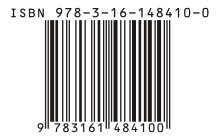Our website is made possible by displaying online advertisements to our visitors.
Please consider supporting us by disabling your ad blocker.
International Standard Book Number

The International Standard Book Number, ISBN, is a unique[1] commercial book identifier barcode. The ISBN system was created in the United Kingdom, in 1966, by the booksellers and stationers W.H. Smith.
Originally, it was the 9-digit Standard Book Numbering (SBN) code and still was used in 1974; it was adopted as the international standard ISO 2108 in 1970. A similar, numeric identification, the International Standard Serial Number (ISSN), identifies periodical publications such as magazines. Since January 1, 2007, ISBNs are of 13 digits, like in Bookland EAN-13.[2] The TC 46/SC 9 is responsible for the standard.
What is the international book publishing certificate?[3]
The international book publication certificate is originally issued by the international organization and institution that is the custodian and producer of the ISBN code. The international certificate of book publication is an online certificate that can be easily inquired about the authenticity of the certificate online with the certificate number in it.
The ISBN number that is present in all books should not be confused with the international certificate of book publication. All books must have an ISBN number, but international book certificates cannot be obtained for all books.
For what books can an international book publishing certificate be obtained?
To receive this certificate, the most important criteria of the publisher's credibility is measured as follows: the number of indexing of the publisher in articles and international forums related to the publisher's documentation. The higher the number, the higher the chance of receiving a certificate. The fact that you have just published a book and taken a isbn will not lead to the issuance of a certificate from isbn-international.com. This site is very strict in reviewing.
And the next criterion is the author, which is of course the next most important.
When the publisher's documentation is strong, the probability of issuing a certificate increases.
Of course, receiving the certificate is not certain.
- ↑ Occasionally publishers will use an ISBN for more than one title (e.g. the first edition of "The Ultimate Alphabet" and "The Ultimate Alphabet Workbook" have the same ISBN, 0-8050-0076-3). On the other hand, books can be published with more than one ISBN: A German-as-a-second-language edition of Emil und die Detektive has the ISBNs 87-23-90157-8 (Denmark), 0-8219-1069-8 (United States), 91-21-15628-X (Sweden), 0-85048-548-7 (England) and 3-12-675495-3 (Germany).
- ↑ See Frequently Asked Questions about the new ISBN standard Archived June 10, 2007, at the Wayback Machine from ISO
- ↑ "international book publishing certificate".
Previous Page Next Page


